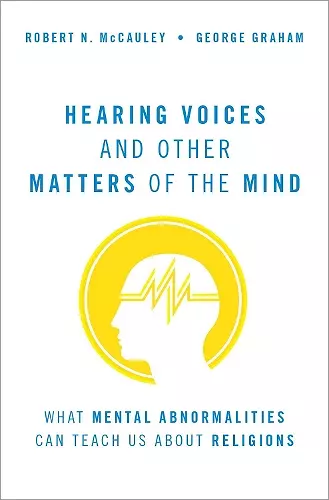Hearing Voices and Other Matters of the Mind
What Mental Abnormalities Can Teach Us About Religions
George Graham author Robert N McCauley author
Format:Hardback
Publisher:Oxford University Press Inc
Published:22nd Jun '20
Currently unavailable, and unfortunately no date known when it will be back

A man with schizophrenia believes that God is instructing him through the public address system in a bus station. A nun falls into a decades-long depression because she believes that God refuses to answer her prayers. A neighborhood parishioner is bedeviled with anxiety because he believes that a certain religious ritual must be repeated, repeated, and repeated lest God punish him. To what extent are such manifestations of religious thinking analogous to mental disorder? Does mental dysfunction bring an individual closer to religious experience or thought? Hearing Voices and Other Unusual Experiences explores these questions using the tools of the cognitive science of religion and the philosophy of psychopathology. Robert McCauley and George Graham emphasize underlying cognitive continuities between familiar features of religiosity, of mental disorders, and of everyday thinking and action. They contend that much religious thought and behavior can be explained as the cultural activation of our natural cognitive systems, which address matters that are essential to human survival: hazard precautions, agency detection, language processing, and theory of mind. Those systems produce responses to cultural stimuli that may mimic features of cognition and conduct associated with mental disorders, but which are sometimes coded as "religious" depending on the context. The authors examine hallucinations of the voice of God and of other supernatural agents, spiritual depression often described as a "dark night of the soul," religious scrupulosity and compulsiveness, and challenges to theistic cognition that Autistic Spectrum Disorder poses. Their approach promises to shed light on both mental abnormalities and religiosity.
Hearing Voices will be of great interest to those invested in the cognitive science of religion. * Robert F. Shedinger, Luther College, European Society for the Study of Science and Theology (ESSSAT) *
What do speaking in tongues, the dark night of the soul, and endless repetition ofritual share in common? McCauley and Graham's book has some tantalizing answers. This is a wonderful book filled with many insights about some of the great mysteries of religious thinking and experience. * Ara Norenzayan, author of Big Gods: How Religion Transformed Cooperation and Conflict *
This book shows that the study of religious experiences and mental disorders can and should inform each other. In the process it makes an eloquent plea for ecumenical naturalism, emphasizing the need to break down disciplinary silos while strengthening commitment to scientific methods. This should be a clarion call for all branches of the social and cognitive sciences. Hats off to McCauley and Graham for showing us how it can be done. * Harvey Whitehouse, Chair of Social Anthropology, University of Oxford *
Studying what happens when the mind goes awry can give us insights concerning normal psychological functioning. McCauley and Graham apply this principle to religious thought and action to great effect. Well-studied and convincingly presented, Hearing Voices and Other Matters of the Mind is without peer in productively bringing psychopathology and the scientific study of religion together. * Justin L. Barrett, author of Born Believers: The Science of Children's Religious Beliefs *
McCauley and Graham are leading figures in philosophy mind, philosophy of psychiatry, and the cognitive science of religion. Hearing Voices and Other Matters of the Mind is a deeply respectful, humane, and productive exploration of familiar existential states of mind — dark nights of the soul, expansive love, anxiety, fear and trembling, depression, transcendence, and hope — that are sources for spiritual impulses. A central focus is the fact that sometimes spiritual virtuosity seems like what from another perspective we might think are illusions and delusions, mental illness. What are we to make of this? This is a book of great wisdom and grace in the tradition of Soren Kierkegaard and William James. A book that really makes one think. * Owen Flanagan, James B. Duke Professor of Philosophy, Duke University *
ISBN: 9780190091149
Dimensions: 160mm x 236mm x 31mm
Weight: 522g
280 pages